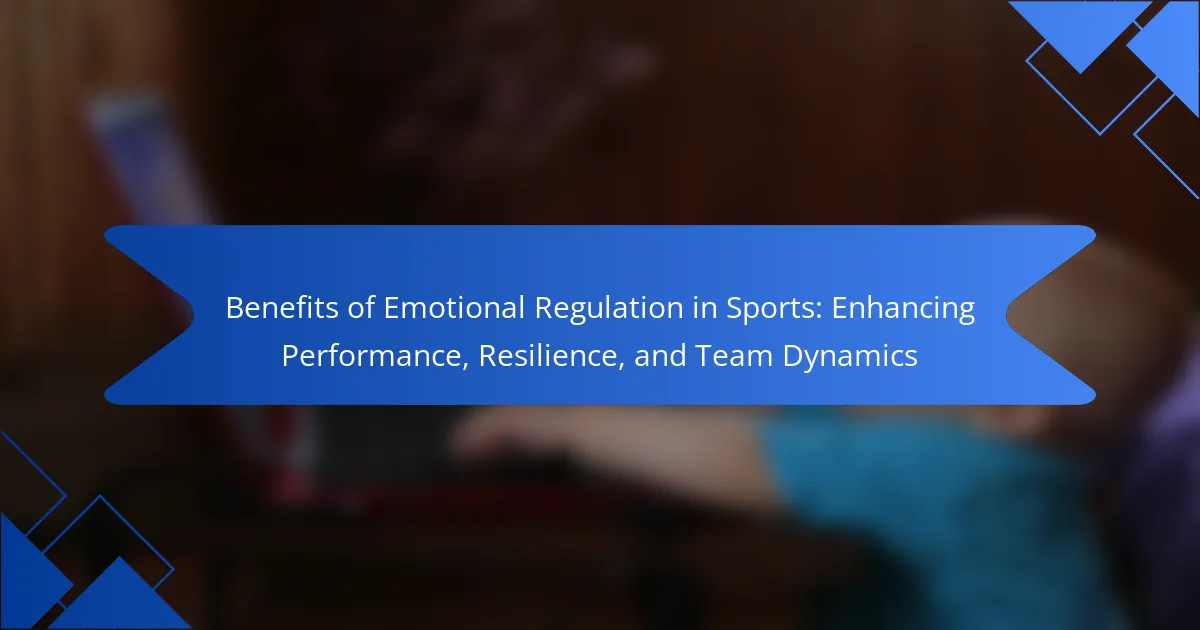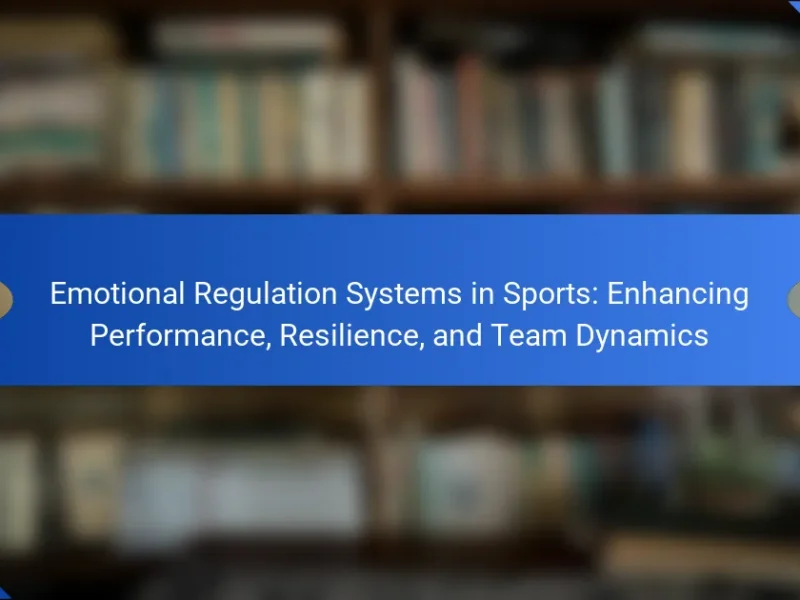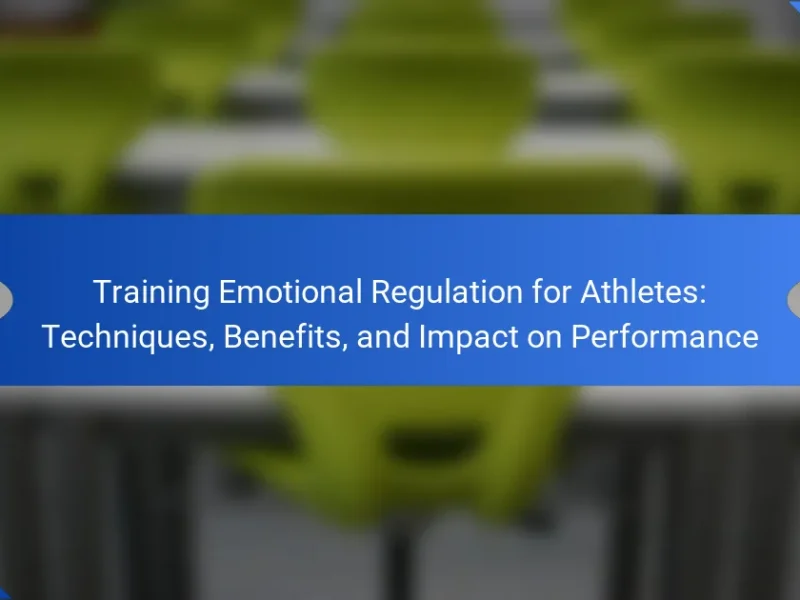Emotional regulation significantly enhances athletic performance, resilience, and team dynamics. It improves focus for better decision-making, fosters resilience to recover from setbacks, and promotes positive communication among team members. Key practices like mindfulness and cognitive restructuring further support these benefits, contributing to improved mental health and cohesive teamwork. Understanding these aspects can lead to greater success in competitive sports environments.

What are the core benefits of emotional regulation in sports?
Emotional regulation in sports enhances performance, resilience, and team dynamics. Athletes who manage their emotions effectively experience improved focus, enabling better decision-making during competitions. This skill fosters resilience, allowing athletes to recover quickly from setbacks and maintain motivation. Furthermore, emotional regulation contributes to positive team dynamics by promoting communication and collaboration among team members. Research shows that teams with emotionally intelligent players demonstrate higher levels of cohesion and success.
How does emotional regulation enhance athletic performance?
Emotional regulation significantly enhances athletic performance by improving focus, resilience, and team dynamics. Athletes who effectively manage their emotions can maintain concentration under pressure, leading to better decision-making and execution. Enhanced emotional control fosters resilience, enabling athletes to recover from setbacks quickly. Additionally, it promotes positive team dynamics, as regulated emotions contribute to improved communication and collaboration among team members. These benefits collectively lead to superior performance outcomes in competitive sports.
In what ways does emotional regulation contribute to resilience in athletes?
Emotional regulation significantly enhances resilience in athletes by enabling them to manage stress and maintain focus during competitions. This ability fosters mental toughness, allowing athletes to recover from setbacks and maintain motivation. Research indicates that athletes with strong emotional regulation skills demonstrate improved performance under pressure, leading to better outcomes in high-stakes situations. Furthermore, effective emotional regulation contributes to positive team dynamics, promoting collaboration and support among teammates.
How can emotional regulation improve team dynamics?
Emotional regulation significantly enhances team dynamics by fostering better communication and collaboration. Teams with members who manage their emotions effectively exhibit increased trust and reduced conflict. This leads to improved performance and resilience, as individuals can focus on collective goals rather than personal frustrations. Research indicates that emotionally regulated teams are more adaptable, enabling them to navigate challenges efficiently. By cultivating emotional awareness and regulation, sports teams can create a supportive environment that drives success.

What universal attributes characterize emotional regulation systems?
Emotional regulation systems enhance athletes’ performance, resilience, and team dynamics. Key universal attributes include self-awareness, emotional control, adaptability, and motivation. Self-awareness allows athletes to recognize their emotions, while emotional control helps manage reactions. Adaptability enables quick responses to changing circumstances, and motivation drives sustained effort and focus. These attributes collectively contribute to improved mental health and performance in sports contexts.
How does emotional awareness play a role in sports?
Emotional awareness significantly enhances sports performance by improving focus, resilience, and team dynamics. Athletes who recognize and manage their emotions can maintain composure under pressure, leading to better decision-making. This regulation fosters resilience, allowing individuals to recover quickly from setbacks, ultimately enhancing overall performance.
Additionally, emotional awareness contributes to positive team dynamics. Athletes who understand their emotions communicate effectively, fostering trust and collaboration. This synergy enhances team cohesion, which is critical for success in competitive environments. Recognizing and addressing emotional states creates a supportive atmosphere, driving collective performance forward.
What techniques are commonly used for emotional regulation in sports?
Common techniques for emotional regulation in sports include mindfulness, cognitive restructuring, and deep breathing exercises. These methods enhance performance, resilience, and team dynamics by enabling athletes to manage stress and maintain focus. Mindfulness improves present-moment awareness, while cognitive restructuring helps athletes reframe negative thoughts. Deep breathing exercises promote relaxation and reduce anxiety, ultimately fostering a supportive team environment.

What unique benefits arise from effective emotional regulation?
Effective emotional regulation enhances performance, resilience, and team dynamics in sports. Athletes who master emotional regulation experience improved focus, leading to better decision-making during competitions. This regulation fosters resilience, enabling athletes to recover from setbacks quickly. Additionally, it enhances team dynamics by promoting positive communication and reducing conflicts, which is essential for cohesive teamwork. Emotional regulation also contributes to mental well-being, reducing anxiety and stress levels, which can further enhance athletic performance.
How does emotional regulation affect decision-making under pressure?
Emotional regulation significantly enhances decision-making under pressure by promoting clarity and focus. Athletes who effectively manage their emotions can better analyze situations, leading to improved performance outcomes.
Research indicates that emotional regulation fosters resilience, enabling athletes to bounce back from setbacks. This ability to maintain composure allows for more strategic thinking during high-stress moments.
Moreover, emotional regulation contributes to positive team dynamics. Teams with emotionally intelligent members communicate more effectively, fostering collaboration and trust, which are crucial during critical game situations.
In summary, emotional regulation not only enhances individual performance but also strengthens team cohesion, ultimately leading to better decision-making in sports.
What role does emotional regulation play in injury recovery?
Emotional regulation significantly aids injury recovery by enhancing mental resilience and promoting a positive mindset. It helps athletes cope with the emotional challenges of rehabilitation, leading to improved adherence to recovery protocols. Studies show that athletes who practice emotional regulation techniques experience less anxiety and greater motivation, which can accelerate healing. Furthermore, effective emotional regulation fosters better team dynamics, as athletes support one another through the recovery process, creating a more cohesive environment.
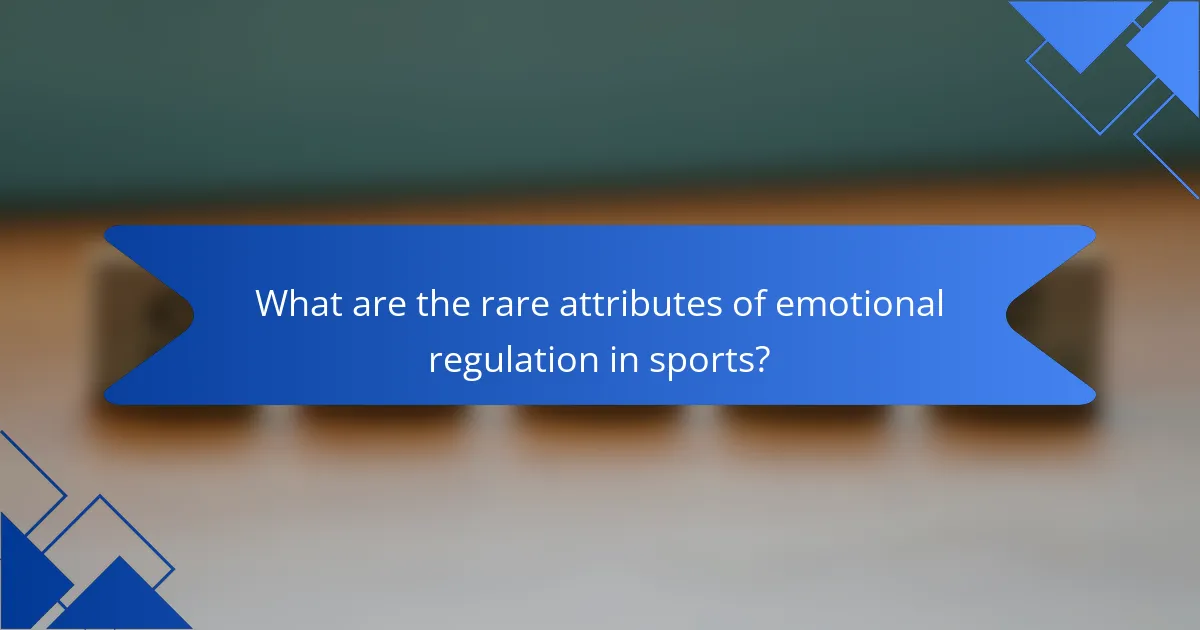
What are the rare attributes of emotional regulation in sports?
Emotional regulation in sports enhances performance through unique attributes such as heightened self-awareness, improved focus, and adaptive coping strategies. These rare attributes allow athletes to manage stress effectively, maintain composure under pressure, and foster positive team dynamics. Enhanced emotional regulation leads to resilience, enabling athletes to recover from setbacks and perform consistently. Additionally, these attributes cultivate a supportive environment, encouraging collaboration and communication among team members.
How do cultural factors influence emotional regulation practices?
Cultural factors significantly shape emotional regulation practices in sports. These factors influence how athletes manage emotions, impacting performance and team dynamics.
Cultural norms dictate emotional expression, leading to variations in emotional regulation strategies. For instance, collectivist cultures may emphasize group harmony, prompting athletes to suppress individual emotions for team cohesion. Conversely, individualistic cultures may encourage open emotional expression, fostering personal resilience and self-advocacy.
The integration of cultural values into emotional regulation can enhance performance. Athletes who align their emotional strategies with cultural expectations often experience improved focus and resilience. This alignment fosters a supportive environment, enhancing team dynamics and overall performance outcomes.
Understanding these cultural influences is essential for coaches and sports psychologists. Tailoring emotional regulation practices to fit cultural contexts can optimize athlete performance and foster a resilient team culture.
What innovative approaches are being used in major sports leagues?
Innovative approaches in major sports leagues focus on emotional regulation to enhance performance and team dynamics. Techniques like mindfulness training and cognitive-behavioral strategies help athletes manage stress and improve resilience. Research shows that teams employing emotional regulation strategies experience better communication and collaboration. For example, the NBA has integrated mental health professionals to support players’ emotional well-being, leading to improved on-court performance.
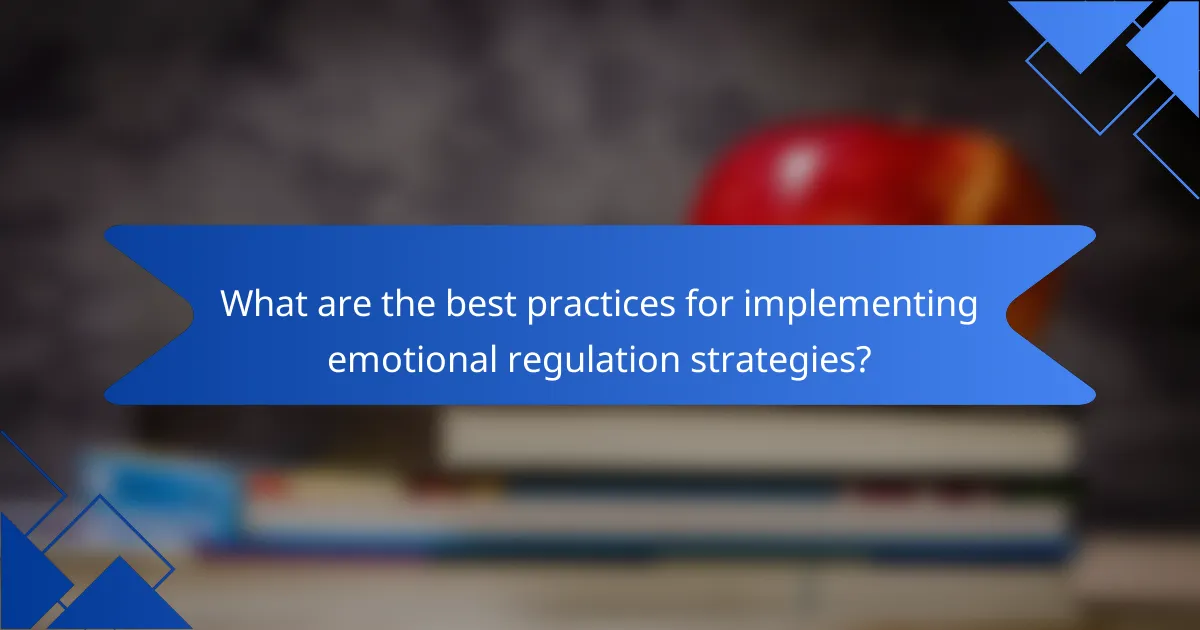
What are the best practices for implementing emotional regulation strategies?
Implementing emotional regulation strategies enhances athletic performance, resilience, and team dynamics. Key practices include mindfulness techniques, cognitive restructuring, and effective communication. Mindfulness helps athletes stay focused and reduce anxiety. Cognitive restructuring allows for reframing negative thoughts, promoting a positive mindset. Effective communication fosters team cohesion and understanding, essential for collaboration. These practices collectively contribute to improved performance and stronger team dynamics.
How can coaches foster emotional regulation in their teams?
Coaches can foster emotional regulation by implementing strategies that enhance team dynamics and individual resilience. These strategies include promoting open communication, teaching mindfulness techniques, and encouraging self-reflection.
Open communication allows team members to express their feelings, which can alleviate stress and improve overall morale. Mindfulness techniques, such as breathing exercises, help athletes manage anxiety and maintain focus during high-pressure situations. Self-reflection encourages players to assess their emotional responses, leading to greater self-awareness and improved emotional control.
As a result, fostering emotional regulation not only enhances individual performance but also strengthens team cohesion. Teams that effectively manage emotions exhibit higher resilience and adaptability, which are critical for success in competitive environments.
What common mistakes should athletes avoid in emotional regulation?
Athletes should avoid common mistakes in emotional regulation, such as suppressing emotions, ignoring stress signals, and overreacting to setbacks. These errors can hinder performance and team dynamics. Recognizing and addressing emotions leads to improved resilience and better decision-making. Effective emotional regulation enhances focus, allowing athletes to perform at their best under pressure.
What expert insights can enhance emotional regulation practices?
Expert insights can significantly enhance emotional regulation practices in sports. Techniques such as mindfulness training improve focus and reduce anxiety, leading to better performance. Cognitive-behavioral strategies help athletes reframe negative thoughts, fostering resilience. Team-building exercises enhance communication, promoting positive team dynamics. Regular mental skills training sessions can solidify these practices, ensuring athletes remain emotionally balanced during competitions.
